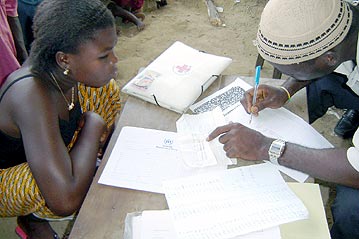Ivorian refugee arrivals in Liberia reach 13,000
Ivorian refugee arrivals in Liberia reach 13,000

BIMPLAY, Liberia, Nov. 17 (UNHCR) - The number of people fleeing Côte d'Ivoire to neighbouring Liberia climbed to 13,000 on Wednesday with the overnight arrival of more than 1,000 Ivorians, who joined 2,000 others seeking refuge in the north-eastern Liberian town of Bimplay.
UNHCR staff also reported the arrival over the past few days of nearly 900 Liberians who had been refugees in Côte d'Ivoire.
The latest Ivorian arrivals began crossing the border overnight Tuesday and into Wednesday in the area around Bimplay in north-eastern Liberia. They said they fled after hearing fighting. UNHCR staff on the scene said the refugees were mostly women and children, who joined 2,000 other refugees already in the town. Bimplay is about 25 km north of the town of Butuo, which has itself received thousands of refugees over the past 12 days.
UNHCR staff said the refugees appeared to be in good health and the situation in Bimplay was "under control". Some relief supplies had already been positioned in the area, but the refugees had to walk across a damaged bridge to get to the aid.
Almost 900 Liberian refugees who fled Côte d'Ivoire have also been counted in three border counties. The Liberian returnees were among some 70,000 Liberian refugees in Côte d'Ivoire - about 12,000 of them in camps.
The Ivorians have been arriving in Liberia through at least 12 entry points along a 45-km stretch of relatively remote frontier, often crossing the border river in small canoes. But UNHCR's monitoring work has been considerably slowed by the remoteness of the region and the very poor state of the roads, many of which are impassable by car. Relief agencies are sending out teams on motorcycles to reach the refugees in the more inaccessible areas. UN helicopters have been used to airlift emergency relief items to Butuo, where the bulk of the newcomers are staying.
UNHCR has set up a temporary transit centre to shelter refugees arriving in Butuo. The majority of the refugees are, for the time being, staying in public buildings or with local people. Food is in short supply. Liberia is itself just coming out of 14 years of civil strife, and this year's harvest was the first since the end of the conflict. Water and sanitation are also problems. A community health centre is open, although there is an acute shortage of medical supplies.
The humanitarian dimension of the crisis in Côte d'Ivoire and its potential impact on Liberia are of grave concern to UNHCR, which just a month ago began a massive, two-year voluntary repatriation programme for the 340,000 Liberian refugees currently scattered throughout West Africa.
High Commissioner for Refugees Ruud Lubbers has warned that a large influx of refugees into Liberia could be disastrous for a nation just emerging from 14 years of conflict and pose a threat to the stability of the entire region.








